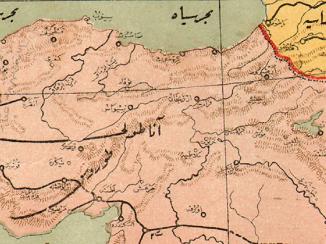Overview
The First World War and its Opportunities for the Kurds
When the First World War began, ethnic minorities living in the Ottoman Empire faced a difficult choice. Many had long desired to break away from Ottoman rule, and the growing popularity of Turkish nationalism threatened to undermine the identity and autonomy of non-Turkish ethnic groups within the Empire’s borders. The war, and the sudden presence of invading British, French, and Russian armies, offered a chance to weaken the Ottoman government, and secure a better position once the conflict had ended. The possibility of independence under the protection of a new imperial power was tempting.
The Kurds of Mesopotamia found themselves in this situation as the British Mesopotamia Expeditionary Force advanced through former Ottoman territory. This army’s War Diaries provide insights into the British military’s attempts to enlist Kurdish soldiers in their war effort, and Kurdish leaders’ attempts to exploit British imperial expansion for their own ends. These records also indicate Kurdish post-war aims, and their eventual transition from ally to a source of resistance in British-occupied Iraq.
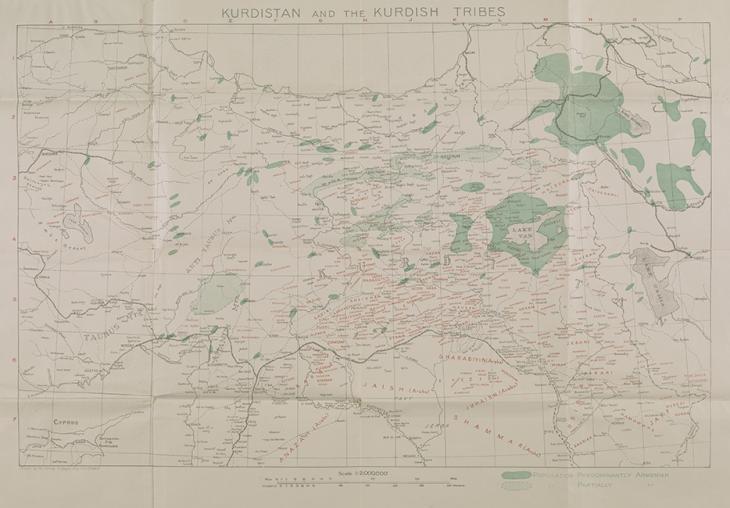
British Intelligence Gathering
The British military collected information on the Kurds of Mesopotamia throughout the campaign, initially aiming to assess their usefulness as allies against the Ottoman state. In a lengthy description, Lieutenant G. S. Reed notes that the Kurds of Hakkari held ‘no feelings of goodwill’ towards the Ottoman Government, and emphasises their historical coexistence with Christian minorities (IOR/L/MIL/17/5/3287, f. 161r). British records also include examples of Kurdish attempts to undermine the Ottoman war effort, such as raids by the ‘Kizil Bash [Qizilbash] Kurds’ on Turkish lines of communication in June 1916 (IOR/L/MIL/17/5/3255, f. 48r).
In addition, Britain took an interest in the poor relations between the Kurds and Russia. The War Diaries refer euphemistically to ‘punitive measures’ employed by Russian forces in areas they had occupied. These reports highlight the problems an occupying force might face due to poor relations with local minorities, and further encourage British officers to consider the advantages of working more closely with anti-Ottoman Kurds.
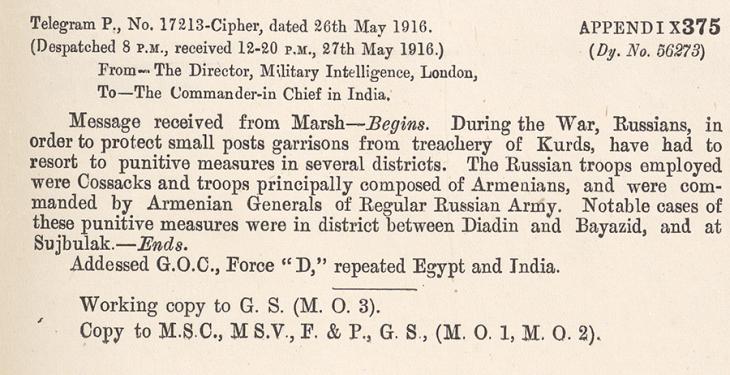
Initial Interactions
British officials considered incorporating Mesopotamian Kurds into the emerging colonial administration. In September 1915, the Political Resident A senior ranking political representative (equivalent to a Consul General) from the diplomatic corps of the Government of India or one of its subordinate provincial governments, in charge of a Political Residency. in the Persian Gulf The historical term used to describe the body of water between the Arabian Peninsula and Iran. suggested enlisting Kurds into the Basra police force. This, he argued, would solve an existing labour shortage and reduce the need to transport police from India. As early as 1915, British officials were adapting their occupation to exploit local resources and personnel; the Kurds were just one of the minorities considered likely to cooperate.
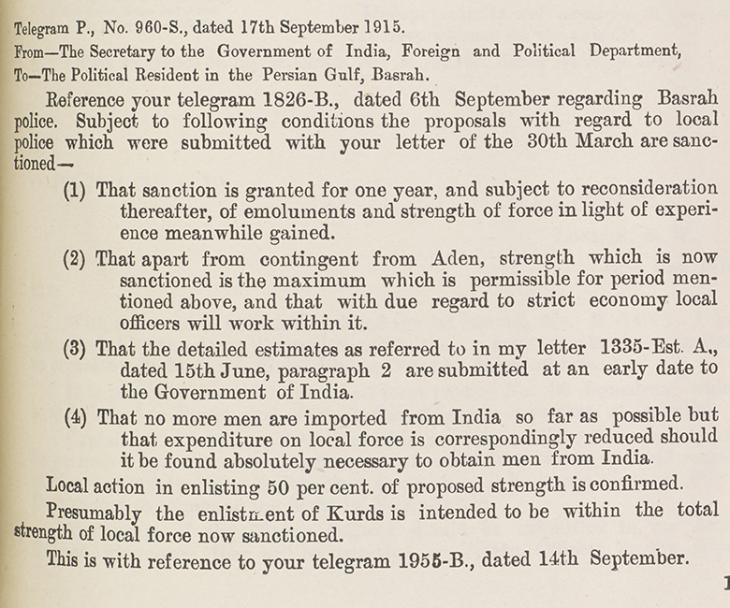
Anglo-Kurdish Diplomacy
The British Directorate of Military Intelligence dispatched representatives to different Kurdish groups in Mesopotamia to gauge their willingness to assist against the Ottoman military. According to British records, some Kurds expressed a preference for British control over the French alternative, due to France’s ‘traditional position as protector of Christian communities’ in the Middle East.
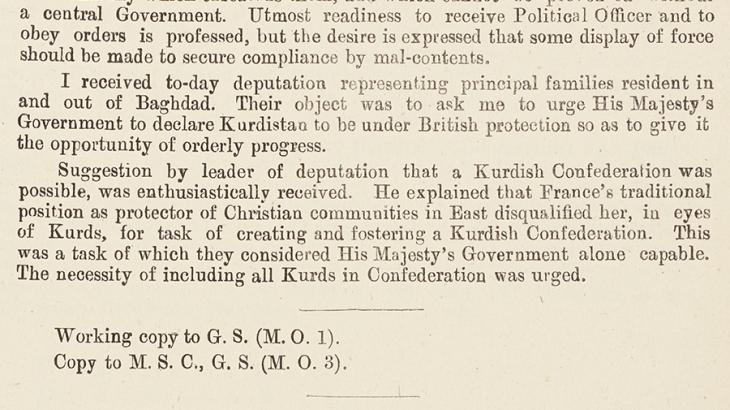
Kurdish leaders took proactive steps to try and secure British imperial support. In November 1918, the British Political Officer at Kifri received a message from Mahmud Barzanji, a leading shaikh of Sulaymaniyah. Barzanji requested that Kurdistan be included on the ‘list of liberated peoples’ in any future peace conference, and asked for instructions ‘especially regarding movement against Turks’ (IOR/L/MIL/17/5/3311, f. 59r). In offering to support Britain in any further actions against the Ottoman Empire, Barzanji expected representation of Kurdish interests when the victorious powers convened to settle the post-war map. He was initially rewarded: in December 1918, shortly after concluding an armistice with the Ottoman forces, Britain oversaw Barzanji’s installation as head of a Kurdish government based in Sulaymaniyah.
British officials displayed some awareness of Kurdish desires for territorial autonomy, but prioritised the new regime’s stability over Kurdish self-determination. Mesopotamia’s different ‘races and classes’ were only granted a ‘degree of liberty and self-rule that [was] compatible with good and safe Government’ (IOR/L/MIL/17/5/3312, f. 50r). In 1919, the Secretary of State for India allowed the creation of a ‘fringe of autonomous Kurdish States’ (IOR/L/MIL/17/5/3322, f. 74r), with the likely intention that they would serve as a buffer to limit the spread of anti-British propaganda from Anatolia Peninsula that forms most of modern-day Turkey. to Iraq. This would thereby insulate the pro-British Iraqi government that Britain was trying to establish.
Rebelling against the New Empire
Ultimately, the possibility of collaboration between Britain and the Kurds of Mesopotamia did not long survive the war. Though some Kurdish tribes continued to support the British occupation, others quickly came to resent it, realising that the removal of Ottoman rule had enabled another imperial power. Major Edward Noel, an experienced British intelligence agent, oversaw a meeting of Kurdish leaders in December 1918. Under his supervision, they officially requested that the Kurds be ‘placed under the British and attached to Iraq for administration’ (IOR/L/MIL/17/15/22 f. 41v). Britain was setting the boundaries of Kurdish aspirations, willing to arrange for Kurdish autonomy as part of a larger British-administered apparatus, but not to concede genuine independence. Britain’s overarching imperial motives were further clarified by the response to this request: Britain accepted the attachment to Iraq, but specified that this policy did not apply to Kurds in Persia, who were ‘to remain loyal subjects of Persia’ (IOR/L/MIL/17/15/22 f. 41v). British imperialists did not intend to unify all Kurds under their “benevolent” aegis, but instead solidified their control over the new Iraqi state, while simultaneously maintaining the integrity and stability of British-influenced Persia.
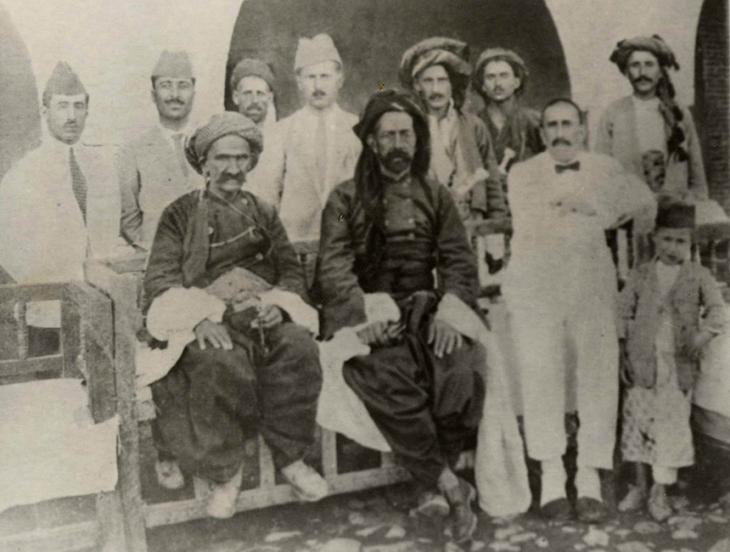
The relationship between Britain and Mahmud Barzanji illustrates the breakdown in Anglo-Kurdish relations. By the spring of 1919, Britain was attempting to limit Barzanji’s power, remove certain areas from under his control, and impose British political officers in others. British military and political officers came to view Barzanji disparagingly as ‘a mere child as regards intellect and breadth of view’, who had developed ‘silly notions’ of being ‘ruler of all Kurdistan’ (IOR/L/MIL/17/15/22, f. 42r). Barzanji launched an armed rebellion against British forces in May, causing the Political Resident to worry that it might inspire similar uprisings in north-west Persia and north Kurdistan.
The British response was swift. By the end of June, British troops had defeated Barzanji’s forces, occupied Sulaymaniyah, and carried out reprisal attacks on Kurdish villages. The Political Resident A senior ranking political representative (equivalent to a Consul General) from the diplomatic corps of the Government of India or one of its subordinate provincial governments, in charge of a Political Residency. dismissed any threat posed by Barzanji, arguing that he ‘had not at any time any popular support’, and that ‘[h]is downfall will have a sobering effect on other would be dictators’ (IOR/L/MIL/17/5/3323, f. 92r). No longer a potential ally, the Kurds had come to be seen as a troublesome minority threatening the stability of a new imperial status quo. As far as British imperial officials were concerned, the Kurds had outlasted their usefulness.










